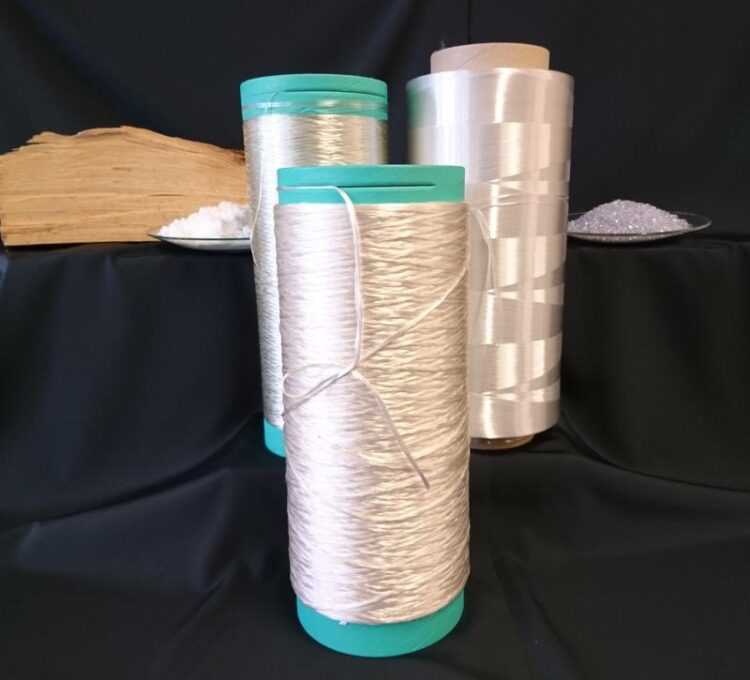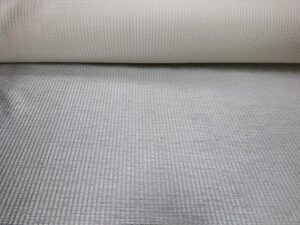CELLUN – a fiber composite made from biopolymers

Starting materials for the production of sustainable composites
(c) DITF
Together with project partners CG TEC, Cordenka, ElringKlinger, Fiber Engineering and Technikum Laubholz, DITF is developing a new fiber composite material (CELLUN) with reinforcing fibers made of cellulose.
CELLUN made from renewable biopolymers enables the replacement of glass or carbon fibers in the production of industrial molded parts.The matrix of the material is a thermoplastic cellulose derivative that can be processed in industrial processing methods such as hot pressing or pultrusion.

(c) DITF
Organosheets are increasingly being used within the fast-growing segment of lightweight fiber composite construction. Organosheets are pre-consolidated semi-finished sheet products with a matrix of thermoplastics and various reinforcing fibers in a wide variety of textile designs. The thermoplastic matrix allows the organosheets to be processed using industry-established “fast” processes such as hot pressing, thermoforming, injection molding with organosheet inserts, or pultrusion. The processes produce highly recyclable, highly functionalized components with reproducible quality.
The textile reinforcement of organosheets consists mainly of glass, carbon, basalt or aramid fibers. These fibers have high stiffnesses and tensile strengths, but are energy-intensive to manufacture and recycle and can only be recycled in an increasingly low-grade condition.
In contrast, the CELLUN composite developed at DITF is a much more sustainable alternative. For the production of CELLUN, the reinforcing component is combined from non-fusible cellulose fibers as well as thermoplastic derivatized cellulose fibers as matrix to form a hybrid roving. The cellulosic reinforcing fibers used are regenerated fibers from the company Cordenka and the HighPerCell® cellulose fibers developed at DITF.
CELLUN is now being further developed to industrial maturity as part of a joint project funded by the German Federal Ministry of Economics and Climate Protection (BMWK). The tasks of the DITF in the CELLUN joint project are primarily the production of suitable cellulose-based reinforcing fibers and the embedding of the fibers in the thermoplastic cellulose derivative matrix. The material is further processed in the in-house pilot plants into technical hybrid rovings and hybrid textiles. Using pultrusion and thermoforming processes or injection molding, molded parts can finally be produced that illustrate the technical application possibilities of the new material.
In the further course of the project, the focus will be on the complete recycling of the CELLUN material after the end of life (EOL). Two different approaches are being researched for this purpose. On the one hand, it is possible to thermally reshape CELLUN molded parts without any loss of quality. A second possible approach is to chemically separate the CELLUN material into its individual components again. These can then be used again 100% as new starting materials.
The novel CELLUN materials will offer a real advantage in the market for semi-finished technical products as an environmentally friendly, resource-conserving and cost-effective alternative to established composites in the lightweight construction and automotive sectors. By using renewable biopolymers, CELLUN will make a significant contribution to environmental and climate protection: on the one hand, conventional crude oil-based plastics can be substituted, and on the other hand, CELLUN reinforcement and matrix fibers can be produced with only low energy input and from natural raw materials.
The joint project CELLUN, funding code 03LB3011A, has been funded by the German Federal Ministry of Economics and Climate Protection since January 1, 2022.
Contact for scientific information:
Dr. Tanja Schneck
Deutsche Institute für Textil- und Faserforschung
Competence Center Biopolymer Materials
Tel. +49 (0)711 / 9340-407
tanja.schneck@ditf.de
Media Contact
All latest news from the category: Materials Sciences
Materials management deals with the research, development, manufacturing and processing of raw and industrial materials. Key aspects here are biological and medical issues, which play an increasingly important role in this field.
innovations-report offers in-depth articles related to the development and application of materials and the structure and properties of new materials.
Newest articles

A blueprint for mapping melting ice sheets
Researchers in the Stanford Radio Glaciology lab use radio waves to understand rapidly changing ice sheets and their contributions to global sea-level rise. This technique has revealed groundwater beneath Greenland,…

Water hyacinth plant pots – utilization of an invasive species
Together with Fiber Engineering GmbH, the DITF presents a process for the production of biodegradable plant pots. The products are cost effective and competitive. At the same time, the production…

Current research on the new 6G mobile communications standard
Nursing care robots, autonomous driving, digital twins: all of these high-tech applications will play an essential role for the new 6G mobile communications standard. The first commercial 6G networks are…



